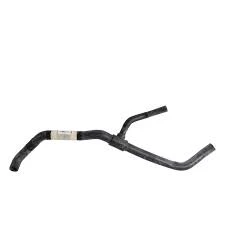diesel fuel return hose
Sep . 14, 2024 03:51 Back to list
diesel fuel return hose
Understanding Diesel Fuel Return Hoses Importance and Functionality
Diesel fuel return hoses play a crucial role in the overall functionality of diesel engines, ensuring efficient operation and longevity. Often overlooked, these hoses are integral to the fuel system, enabling the return of unutilized fuel back to the tank. Understanding their design, purpose, and maintenance is essential for diesel engine operators and mechanics alike.
Structure and Composition
Typically made from high-quality rubber or synthetic materials, diesel fuel return hoses are designed to withstand the high temperatures and pressures found within a diesel engine's fuel system. They must be resilient enough to resist the corrosive nature of diesel, as well as the wear and tear that comes from exposure to fuel over time. These hoses are often reinforced with braided fibers to enhance durability and flexibility, making them capable of handling the dynamic conditions present within the engine.
Purpose and Functionality
The primary function of the diesel fuel return hose is to return excess fuel back to the fuel tank after it has passed through the engine. In a typical diesel fuel system, fuel is drawn from the tank to the engine for combustion. However, not all fuel is consumed during this process. The return hose allows this surplus fuel to flow back, ensuring that the system remains primed and ready for optimal performance. This process helps maintain a steady supply of fuel at the injector, enhances engine efficiency, and prevents potential issues related to fuel starvation.
diesel fuel return hose

Moreover, the return line also aids in the management of fuel temperature. As fuel circulates through the engine, it can become hot. The return hose allows cooler fuel from the tank to mix with warmer fuel returning from the engine, which can help in maintaining an optimal temperature range. This is particularly important for preventing fuel vaporization, which can lead to starting issues and engine performance problems.
Maintenance and Common Issues
Due to their pivotal role, maintaining the diesel fuel return hose is crucial for the longevity of the fuel system. Regular inspections should be conducted to check for any signs of wear, cracks, or leaks. Over time, hoses can become brittle or develop pinholes, which can lead to fuel leaks—hazarding both safety and efficiency.
If a return hose fails, it can cause a variety of engine issues, including loss of power, decreased efficiency, and increased exhaust emissions. Furthermore, a leaking hose could lead to fuel contamination or even fire hazards. Therefore, any signs of damage should prompt immediate replacement.
Conclusion
In summary, diesel fuel return hoses are vital components that contribute significantly to the operational efficiency of diesel engines. Their ability to manage excess fuel, maintain appropriate temperature levels, and ensure a consistent fuel supply cannot be understated. Understanding their role, alongside proper maintenance practices, enables diesel engine operators to maximize performance and minimize the likelihood of costly repairs. By paying attention to these often-overlooked components, one can ensure the reliability and efficiency of diesel systems for years to come.
